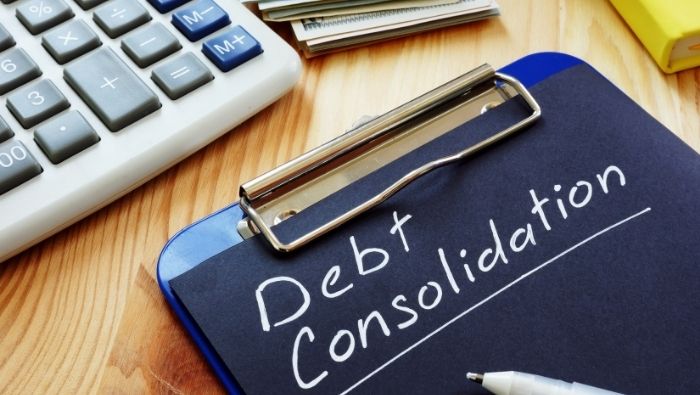The Pros and Cons of 8 Different Ways To Consolidate Debt

If you’re considering consolidating your debt, you should know the pros and cons of your options so you can make a financially wise choice. You don’t want to make a costly mistake that could put you further in debt.
Next to winning the lottery, a debt consolidation loan is a debtor’s dream.
You’ll have one monthly payment and be able to pay off those bills finally.
In reality, consolidating bills isn’t always easy. Finding a consolidation loan at a decent interest rate can be challenging if you have a lot of debt. And if you’re not careful, you can end up deeper in debt than when you started.
Here are the pros and cons of some of the best ways to consolidate debt:
1. Using Credit Cards
Call your card issuers and ask them what rate they can give you to transfer balances from other cards. Aim for fixed rates and no transfer fees when possible. Alternatively, get a new balance transfer card.
Pros: Lower interest rates and no collateral.
Cons: May have hidden traps in low rates; requires decent credit rating.
2. Home Equity Loans or Lines of Credit
Get a low or no-cost loan tied to the equity in your home. In many cases, homeowners can borrow up to 90 to 95% of the value of their home, minus any first mortgage.
Pros: Attractive interest rates and interest is usually tax-deductible.
Cons: Adjustable interest rates and interest-only loans may be somewhat risky. You can lose your home if you miss payments.
3. Cash-Out Refinance
Refinance your current mortgage, and if you have equity available, take “cash out” to pay off other debts.
Pros: Lower interest rates and the interest is usually tax-deductible.
Cons: Cost of refinancing may be 4% or more of the total loan amount; higher payments can put your home at risk.
4. Traditional Debt Consolidation Loans
Get an unsecured loan from a local bank or lender to pay off other debts.
Pros: No collateral or homeownership required.
Cons: Interest rates may be somewhat high, and it’s tough to find if you have much debt or a poor credit rating.
5. Counseling Agencies
Ask a non-profit counseling agency to help structure repayment plans with unsecured creditors. You make one monthly payment to the counseling agency, which pays participating creditors.
Pros: May offer lower interest with fees waived; can improve your credit if you stick with the program.
Cons: Not available for all types of debts. Must choose a reputable agency or risk late payment or other problems.
Sign Up for Savings
Subscribe to get money-saving content by email that can help you stretch your dollars further.
Twice each week, you'll receive articles and tips that can help you free up and keep more of your hard-earned money, even on the tightest of budgets.
We respect your privacy. Unsubscribe at any time.
6. Debt Negotiation or Settlement
Hire a settlement company to negotiate lump sum settlements on your debts, usually 50 to 60 cents on the dollar or less (including fees). The settlement comes from the monthly amount you pay to the settlement company after you stop paying your creditors.
Pros: End creditor harassment, avoid bankruptcy, and usually out of debt in 18 to 24 months.
Cons: Short-term damage to credit rating and some types of loans not eligible. Must choose a reputable agency.
7. Retirement Loans
Borrow against the money in your 401(k), 403(b), or pension plan, usually up to 50% of the balance.
Pros: Easy to get with no credit check or income qualifications. Low interest, paid to yourself.
Cons: May shortchange retirement by keeping it out of investments. May have to pay back debt if you leave your job before the loan is repaid.
8. Rapid Repayment
Create a rapid repayment schedule based on a mathematically optimal way to pay your debts. Pay the highest interest rate debt first, then move down the line. (See Debt Repayment Strategies: The Snowball vs. The Avalanche.)
Pros: Inexpensive, often gives consumers an alternative to debt consolidation.
Cons: May not offer enough relief if you have substantial debt. Need to update the plan as rates and terms on loans change.
Related: Paying Down Credit Card Debt Faster
Mistakes To Avoid
The biggest mistakes people make when it comes to consolidation are:
- Not having a plan for paying the debt off after they’ve consolidated and
- Procrastination. Waiting for the “perfect” solution to come along almost always means you’ll end up deeper in debt. Choose your approach, and start getting out of debt today!
Reviewed September 2023
Sign Up for Savings
Subscribe to get money-saving content by email that can help you stretch your dollars further.
Twice each week, you'll receive articles and tips that can help you free up and keep more of your hard-earned money, even on the tightest of budgets.
We respect your privacy. Unsubscribe at any time.
Wouldn't you like to be a Stretcher too?
Subscribe to get our money-saving content twice per week by email and start living better for less.
We respect your privacy. Unsubscribe at any time.
Popular Articles
- 7 Habits of Highly Frugal People
- 5 Simple Budget Cuts That Can Save $200 a Month
- How to Track Down Unclaimed Funds Owed You
- 32 Ways to Save Money on Your Utility Bills
- Do You Need Credit Life Insurance When Buying a New Car?
- How to Maximize Profits When Selling Online
- Staying Motivated to Continue Digging Yourself Out of Debt
On After50Finances.com
- 9 Things You Need to Do Before You Retire
- You Didn’t Save Enough for Retirement and You’re 55+
- When Empty Nesters Reorganize and Declutter Their Home
- Reinventing Your Career in Your 50s or 60s
- What Mature Homeowners Should Know about Reverse Mortgages
- 2 Reasons to Collect Social Security Benefits As Soon As Possible



